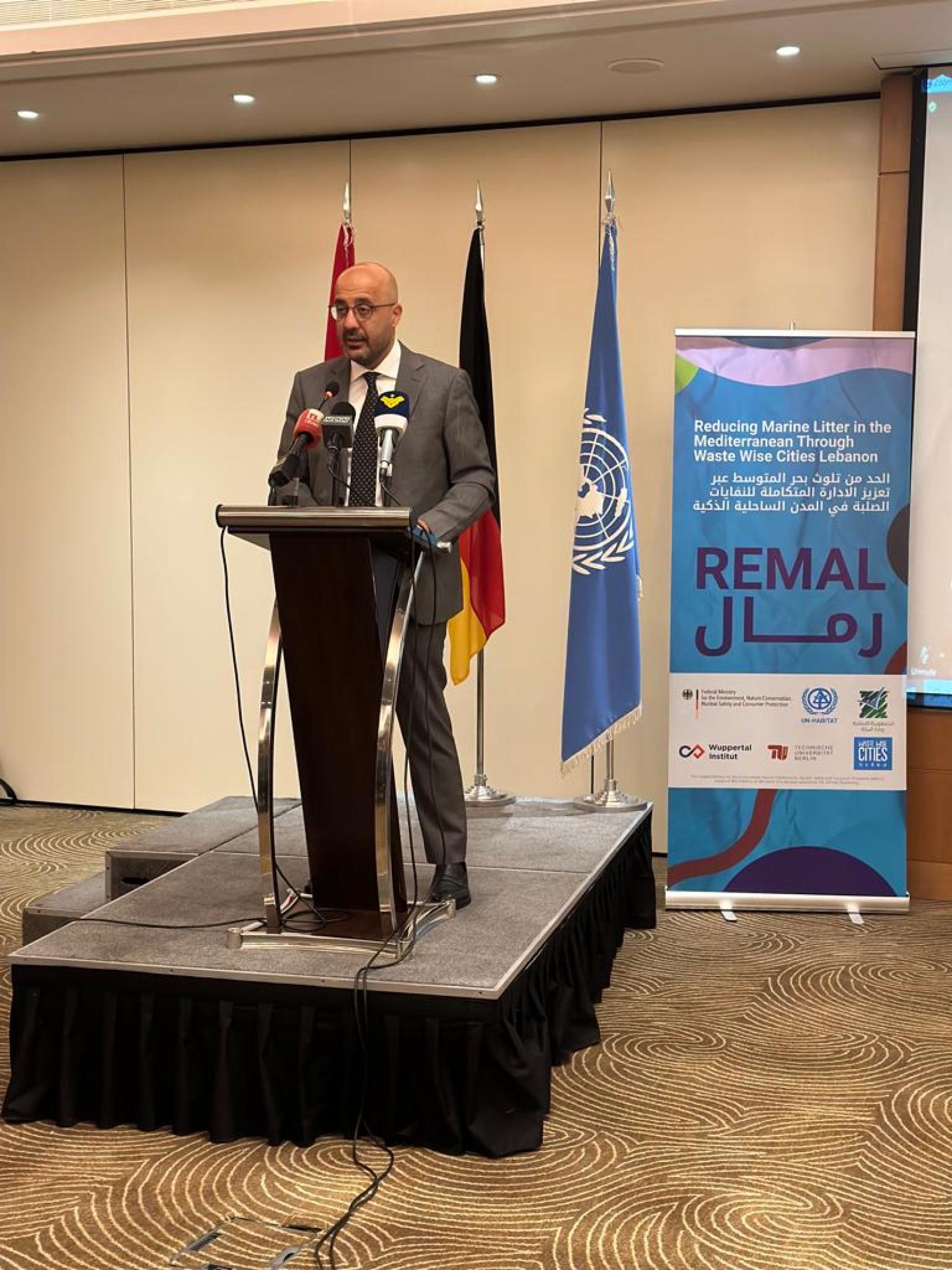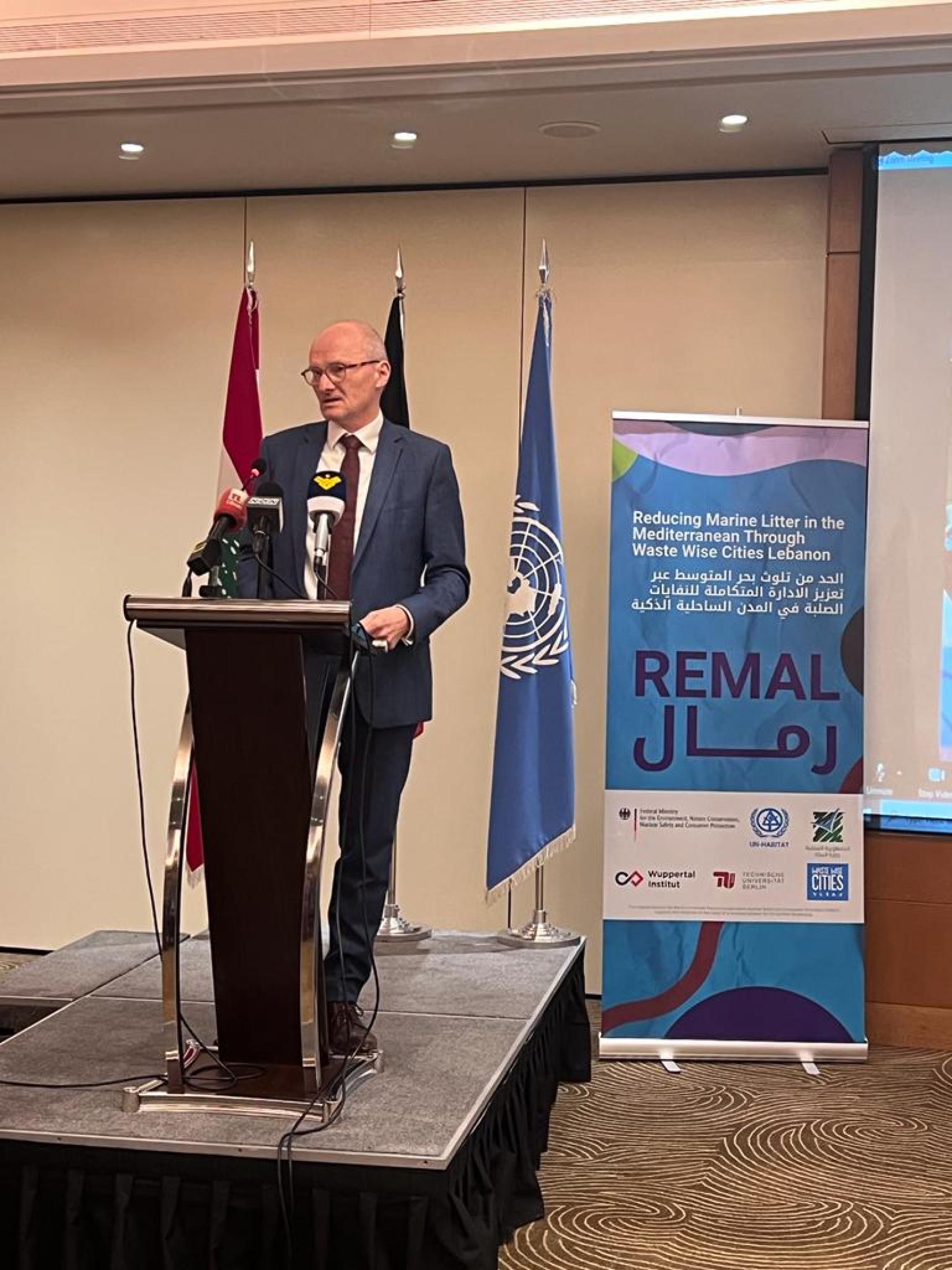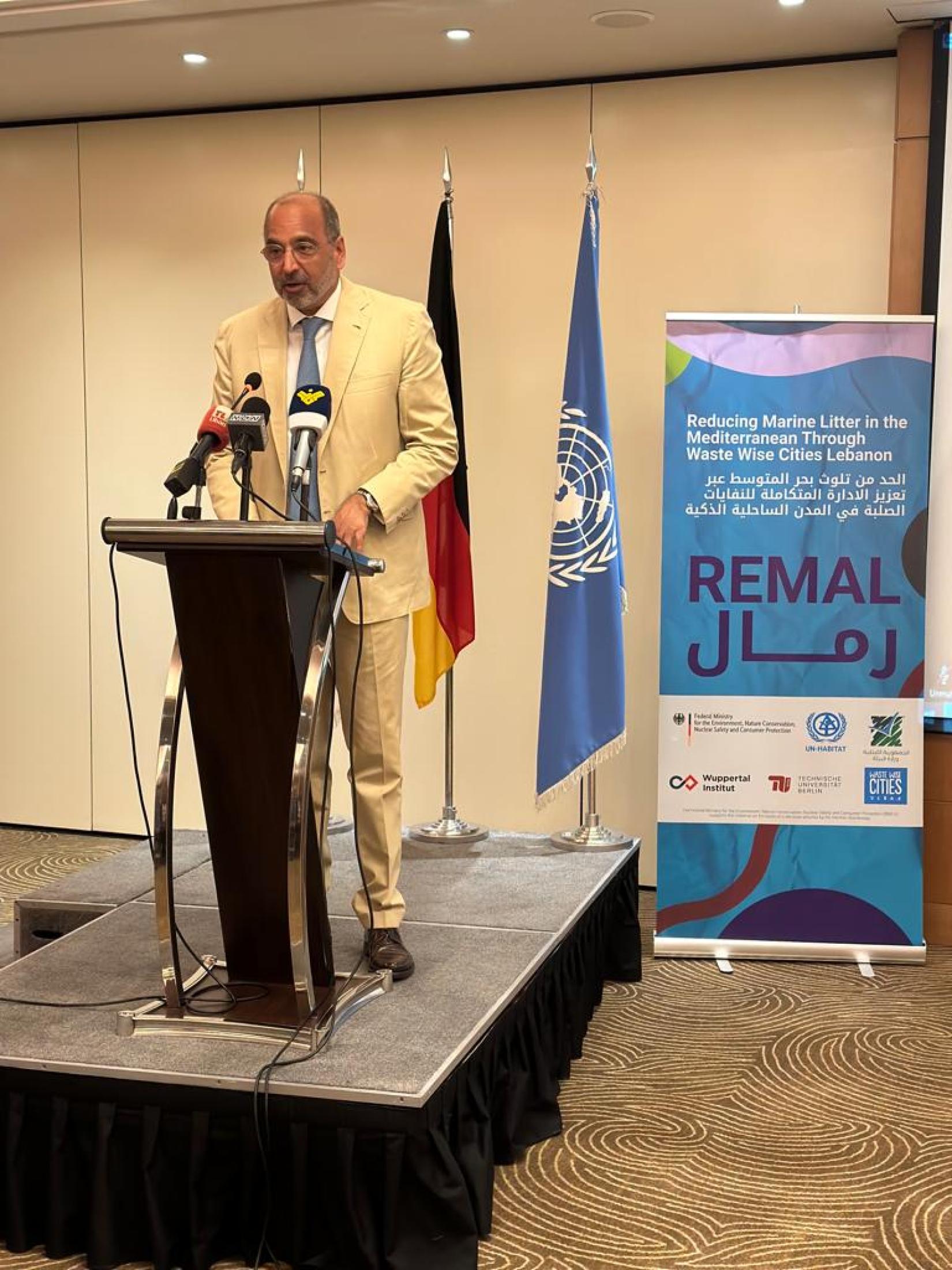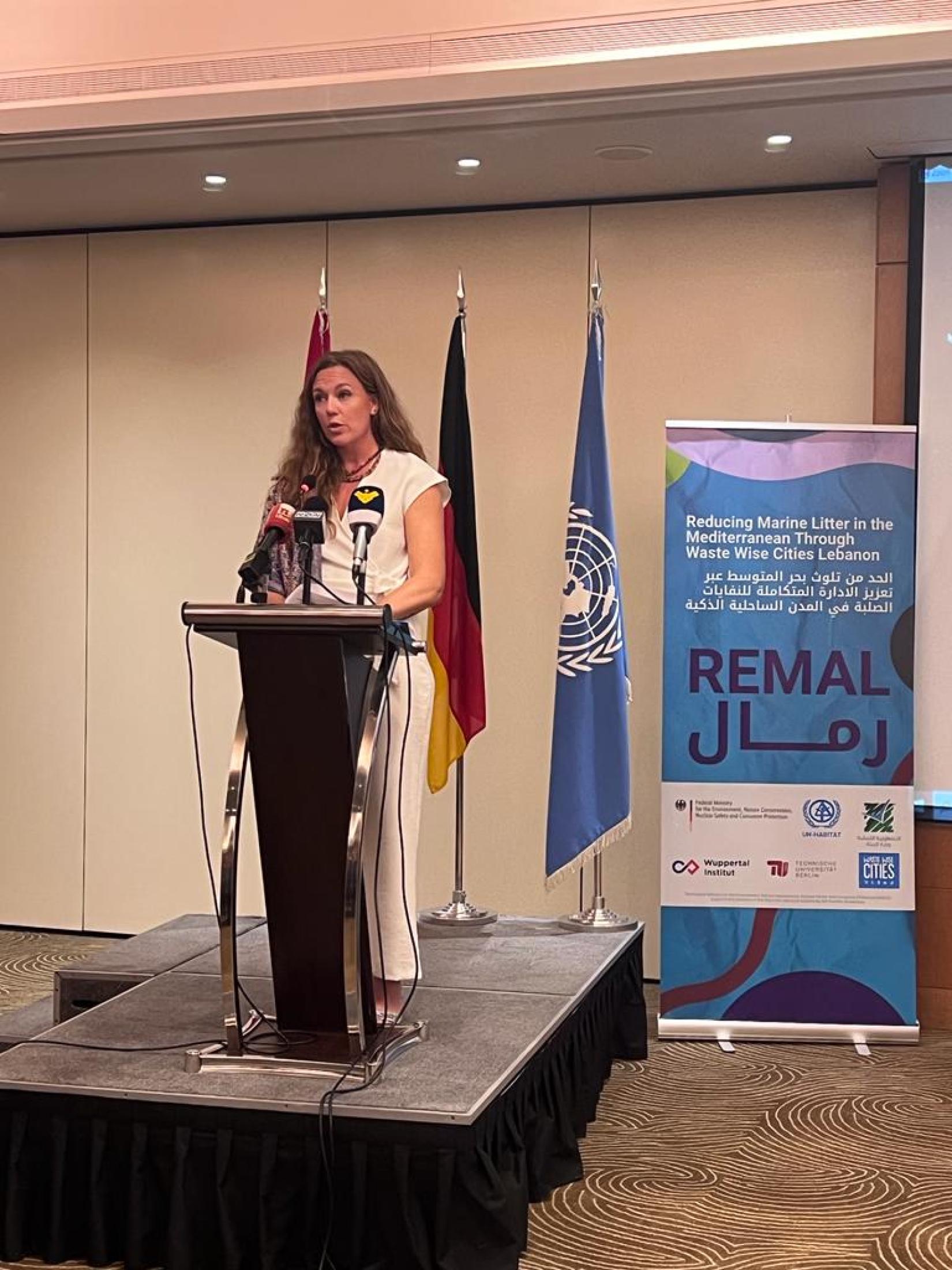UN-Habitat and Ministry of Environment launch nationwide project to reduce marine litter and plastic pollution
07 July 2023
- Beirut, 7 July 2023 -- Under the patronage of the Lebanese Minister of Environment, Dr. Nasser Yassin, and in the presence of the German Ambassador to Lebanon, H.E. Andreas Kindl; and, the United Nations Deputy Special Coordinator, Resident and Humanitarian Coordinator in Lebanon, Imran Riza, in addition to representatives from the public sector, UN agencies, NGOs, and media – UN-Habitat launched today the “Reducing Marine Litter in the Mediterranean through Waste Wise Cities Lebanon” project, also known as “ReMaL.”
Funded by the German Federal Ministry for the Environment, Nature Conservation, and Nuclear Safety at a budget of EUR 4,574,096 and implemented in partnership with the Wuppertal Institute for Climate, Environment and Energy and Technische Universität Berlin, the ReMaL project aims to enhance municipal solid waste management and resource efficiency in coastal Lebanon to reduce marine litter in the Eastern Mediterranean Sea. Specifically, by supporting coastal unions of municipalities and the national government in the implementation of the Integrated Solid Waste Management Law of Lebanon − Law No. 80 (2018).

“The launch of the ReMaL project is a step in the right direction for the environmental recovery of Lebanon. In line with the Ministry of Environment’s vision for the protection and preservation of Lebanon’s natural environment, and the roadmap for integrated solid-waste management, the project will address a major challenge facing Lebanon – particularly in coastal areas to reduce marine litter and plastic pollution. ReMaL project will help in protecting our coastline, our marine life, and our people. Through the project, the Ministry of Environment will work with UN-Habitat to engage municipal authorities and local communities to devise local plans to reduce marine litter and manage their waste in an integrated manner. This will help in making Lebanon's coastal cities cleaner and healthier," said H.E. Dr. Nasser Yassin, Lebanese Minister of Environment.
The ReMaL project will work across several interventions including data collection on waste to inform and establish a National Online Waste Observatory to support evidence-based decision making; development of Integrated Solid Waste Management Plans for coastal service zones; and implementation of pilot projects to improve waste management and prevent marine litter.

“Waste constitutes one of the main problems of Lebanon and its people, and it will remain a challenge for generations to come. To preserve this beautiful country – its mountains and beaches, its forests and plains, its cities and villages, its people and its animals – a huge effort is necessary. I hope that the presence of all of you here today will play out into real action, into long-term commitment, into actual, sustainable improvement. In my term as ambassador to Lebanon, I have been at many such launches and kick-off meetings, but more important is to see the outcome everyone commits themselves to at the start. This project is about a direct, immediate impact on people’s everyday lives. I truly hope that we will see this positive impact, that we can witness progress and success in working on this project,” said H.E. Andreas Kindl, Ambassador of Germany to Lebanon.
As part of this three-year-long project a nationwide awareness-raising campaign on sustainable waste management and marine litter prevention will be rolled-out. The findings of this project will inform the formulation of policy recommendations for national institutions on waste management and marine litter in an effort to improve and build capacities of national frameworks and actors involved.

“In the complex multi-faceted crisis facing Lebanon, which continues to challenge and further exacerbate the country’s humanitarian and development trajectory, it is very important that coordinated steps and measures are taken to prevent further deterioration of an already fragile natural ecosystem. Protecting the marine environment along the Lebanese coast is critical as it provides climate regulation, food, jobs, livelihoods, and socio-economic progress. By bringing together multiple partners, from national to local authorities, international to local organizations, academia, private sector institutions, and local communities – using a bottom-up localized and area-based approach, the ‘ReMaL project’ provides an important opportunity for the UN to reaffirm its commitment to help steer Lebanon back onto the path of sustainable development,” said Mr. Imran Riza, the United Nations Deputy Special Coordinator, Resident and Humanitarian Coordinator for Lebanon, in his opening remarks.
UN-Habitat and partners will work with thirteen unions of municipalities and respective communities throughout the course of the project to ensure that the project’s planned interventions are targeted and based on the needs of their communities to promote uptake, ownership and sustainability.

“Lebanon’s main cities sit along the nation’s coastline. These cities are major contributors to plastic pollution and marine litter. They are therefore also part of the solution to fostering and identifying sustainable solutions to the collection and management of solid waste. By working together with national and local authorities and communities through the ReMaL project, we can set long-term solid waste management practices, clean up our coastlines, protect our marine life, and promote a more sustainable and green future for Lebanon,” said Taina Christiansen, Head of UN-Habitat Lebanon Country Programme.
Since its establishment in 2006, UN-Habitat Lebanon has been working effectively with partners and urban planning actors at the community, national and international levels to develop and implement programmes and interventions across the country that contribute to making cities and human settlements green, inclusive, safe, resilient, and sustainable
-ENDS-
About the United Nations Human Settlements Programme (UN-Habitat)
UN-Habitat works in over 90 countries supporting people in cities and human settlements for a better urban future. Working with governments and local partners, its high impact projects combine world-class expertise and local knowledge to deliver timely and targeted solutions. The 2030 Agenda for Sustainable Development includes a dedicated Goal on cities, SDG 11 – to make cities inclusive, safe, resilient and sustainable.
For media enquiries:
Layal Abou Antoun
UN-Habitat Lebanon
M: +961 81 512629
Saad Elias
Ministry of Environment
M: +961 3 777 855


